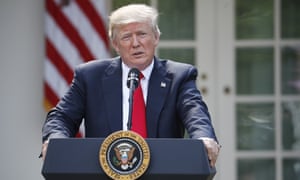Since
day one as a contender for the Oval Office, current US President Donald
Trump has pushed a dominant narrative: he’s a businessman. He gets
economics. He knows the art of the deal. This week, with his decision to
withdraw the US from the Paris agreement, the president has given the world strong reason to reject that narrative.
His rationale – that it’s a choice of economy over environment, and a fossil fuel economy is the top priority – is outdated and false. States and nations around the world have harvested the fruits of clean energy, and are redefining their economies and energy sources accordingly. Yet under false pretenses that “clean coal”, natural gas and other fossil fuel fixes are better than energy conservation and clean energy, the US forges its own, lonely path.
The idea that clean, renewable energy will generate power for our planet for generations to come is not rhetoric. The extent of human-caused climate change – and the rapidly improving economics driving the proliferation of renewable energy sources – make it fact.
If the US administration isn’t ready to move forward, hundreds of individual states and other countries will.
California is already a world leader on climate policy. Texas is rapidly expanding its wind energy capacity. In Germany, clean energy has become a movement itself, focused on thousands of small-scale projects under the Energiewende program. In Scotland, wind generation has increased by 81% over the past year, and in March this year, it produced enough energy to satisfy 136 % of the country’s household energy needs. These are just a few examples.
The US’s withdrawal doesn’t mean Americans and US investors will sit
still, either. There is substantial economic opportunity in renewables.
The US solar industry alone creates one in 50 new jobs.
Worldwide, nearly 10 million people already work in renewable energy.
Global clean technology exports doubled between 2008 and 2015,
surpassing $1.15tn per year. Even America’s corporate giants – from
Apple and Google to Walmart, and even oil giant Exxon Mobil – support
the Paris agreement.
His rationale – that it’s a choice of economy over environment, and a fossil fuel economy is the top priority – is outdated and false. States and nations around the world have harvested the fruits of clean energy, and are redefining their economies and energy sources accordingly. Yet under false pretenses that “clean coal”, natural gas and other fossil fuel fixes are better than energy conservation and clean energy, the US forges its own, lonely path.
The idea that clean, renewable energy will generate power for our planet for generations to come is not rhetoric. The extent of human-caused climate change – and the rapidly improving economics driving the proliferation of renewable energy sources – make it fact.
If the US administration isn’t ready to move forward, hundreds of individual states and other countries will.
California is already a world leader on climate policy. Texas is rapidly expanding its wind energy capacity. In Germany, clean energy has become a movement itself, focused on thousands of small-scale projects under the Energiewende program. In Scotland, wind generation has increased by 81% over the past year, and in March this year, it produced enough energy to satisfy 136 % of the country’s household energy needs. These are just a few examples.
By withdrawing from this historical agreement, Trump will make more enemies than friends.
Polling results from Yale University’s Climate Change in the American Mind survey (conducted after the US election) show that 73% of Trump voters want the US to use more renewable energy. (His own supporters!) As recently as May 7, a small but increasingly vocal group of Republicans has embraced the reality of global warming, taking steps to press the issue in Congress.
Elsewhere in the world, 195 countries and the European Union have signed the Paris Agreement, 147 of which have ratified it. Only Nicaragua and Syria have not signed on.
When news of the potential withdrawal reached the United Nations, the organization’s Twitter page read: “Climate change is undeniable. Climate change is unstoppable. Climate solutions provide opportunities that are unmatchable.”
A Globe and Mail report showed that even fossil fuel companies – the likes of ExxonMobil, BP and Shell – think the US should stick with Paris.
This withdrawal is an ugly decision, made by a country that ought to be leading the transition to a cleaner future – not only because of its stature as an international economic powerhouse, but also because of its less-than-desirable environmental track record.
After China, the US is the world’s second-largest greenhouse gas polluter.
In response, China has been become a leading producer of solar energy technology and is slowing its coal power construction.
The US, meanwhile, hangs on to a coal industry that should have been dissolved decades ago.
Just north of the border in Canada, where I live, the situation is delicate. We have been plagued by recent missteps such as approval of fossil-fuel-driven pipeline projects, but at least our governments claim a commitment to a sustainable, clean energy future. In my home province of British Columbia, recent election results may even reverse the approval of some of those infrastructure projects.
But we’re far from safe ground. These types of actions by the US administration show that environmental rights – for Canada and all countries around the world – are vital, now more than ever. Yet, while 110 countries worldwide have environmental rights written into their constitutions, Canada does not.
I tend to focus my advice on domestic matters like these. But today, I offer a word to the US president:
A global shift to renewable energy is on. There’s no denying it or turning it around. It’s good for business. This is not fake news. It’s real life. And it’s happening with or without you.
You claim you know a good deal when you see one. Well, you just passed on one of the best our planet has ever seen.

No comments:
Post a Comment